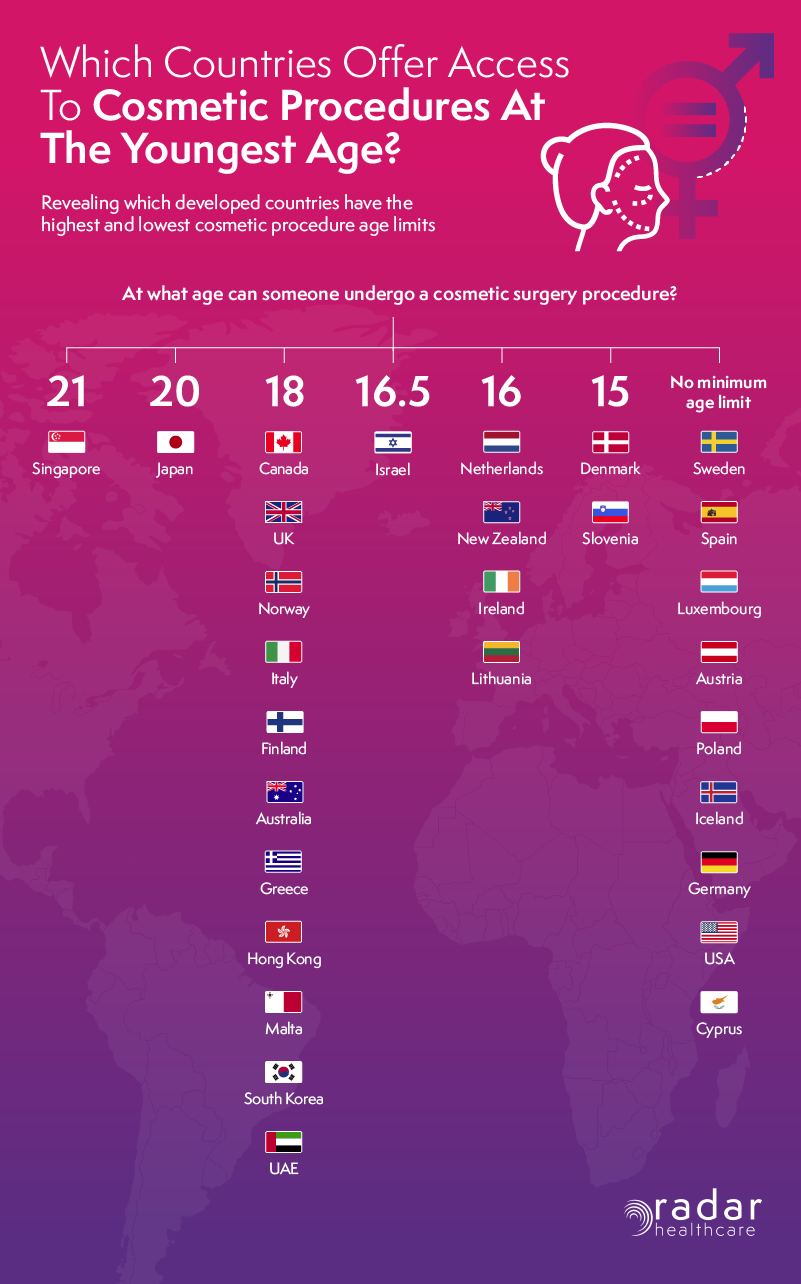What is the Minimum Age for Cosmetic Surgery Procedures Around the World?
Tags:
Global Healthcare Inequalities in Numbers:
Minimum Age for Cosmetic Surgery Procedures Around the World
Understanding global regulations on cosmetic surgery is crucial for patient safety and healthcare equality. This overview, part of our “Global Healthcare Inequalities in Numbers” research, examines which healthcare systems prioritise patient equality based on laws and regulations.
Study Insights
Our study assessed healthcare systems worldwide, focusing here on cosmetic surgery age regulations. Higher scores were given to countries with higher minimum ages, reflecting a commitment to patient safety and maturity.
Take a look at our infographic below for an instant snapshot of the minimum age for cosmetic surgery around the world:

Country Breakdown
Singapore (21 years): Leads with the highest age limit, scoring 5.5/10 in healthcare equality. Despite lower overall equality rankings, stringent cosmetic surgery laws contribute to this score.
Japan (20 years): Second-highest minimum age, scoring 5/10. Despite restrictive hormone treatment regulations for transgender individuals, Japan maintains a strong stance on cosmetic surgery.
Countries with 18 years minimum age: Includes Canada, Norway, Australia, Malta, Italy, Finland, Greece, Hong Kong, UK, South Korea, and UAE. The trend of undergoing surgery at a young age can lead to potential regrets and health risks.
No minimum age: Spain, Poland, USA, Sweden, Austria, Iceland, Cyprus, Luxembourg, and Germany have no age restrictions, raising concerns about the decision-making capacity of minors and healthcare inequality, especially for transgender individuals.
Healthcare Inequality and Transgender Issues
The lack of minimum age requirements in some countries contrasts sharply with stringent regulations for transgender individuals seeking hormone treatments. This highlights significant disparities in healthcare equality.
What Do Our Experts Have to Say on the Subject?
Hayley Levene, Head of Marketing at Radar Healthcare, emphasises the role of technology and data in improving healthcare decision-making. Collaborations with organizations like Public Policy Projects aim to address real-world healthcare inequalities through evidence-based policies.
“Radar Healthcare partners with organisations such as Public Policy Projects who are learning from experience (both their own and others) to make contributions to the policy debate which address real-world choices on the basis of real-world evidence.
“As a healthcare supplier, Radar Healthcare is passionate about helping to make a difference and delivering improved outcomes. Working with PPP to produce reports such as ‘The Social Care Workforce: averting a crisis’, ‘The Digital Divide: reducing inequalities for better health’ and ‘Integrating Health and Social Care: a national care service’ is vital in helping to drive change and improve some of these health inequalities.
“For example, technology could offer oversight that 80% of patients or healthcare workers themselves are having suicidal thoughts – and this could prompt a process to be followed to tackle it, which will encourage decisions of change.”
Conclusion
Regulatory age limits for cosmetic surgery are crucial for ensuring patient safety and consistency in healthcare practices. Continued research and technological advancements are essential for addressing these disparities.
The Health Inequalities Report by the experts at Radar Healthcare discovers which of the world’s most developed countries offer the best healthcare in regards to a wide range of healthcare rights for citizens through their regulations and laws.
Taking a seed list of the top 35 most developed countries around the world, the report reveals the laws relating to the following in order to assess the biggest areas of inequality across different territories and how it impacts those of different genders, age groups, financial and sociological status, parenthood, surgery, birth control, and abortions:
- The legal age of consent – the age at which a person is considered to be legally competent to consent to sexual acts
- Doctor / patient confidentiality ages – the age a resident can speak confidentiality to a healthcare professional without parents/guardians being informed
- Cervical cancer screening – what age are they recommended for women around the world
- Mammogram screening tests – what age are they recommended for women
- Flu vaccines – at what age is this offered to elderly residents around the globe
- IVF treatment age range – how does your age impact your chances of becoming a parent via in-vitro in different countries around the world
- Cosmetic surgery – at what ages can someone have a cosmetic surgery procedure
- Transgender hormone treatment – at what age do healthcare practitioners in different countries allow transgender patients to start hormone treatment
- Access to birth control around the world – (age requirements/costs/the countries offering free birth control)
- Abortion laws – how do they differ across the world
- Maternity leave laws – How much maternity leave are new mothers legally entitled to both paid and unpaid
- Paternity Leave – Parental right for working fathers/partners around the world






